Make Room For Harry Harrison: Anthony Aycock on a Forgotten SF Master
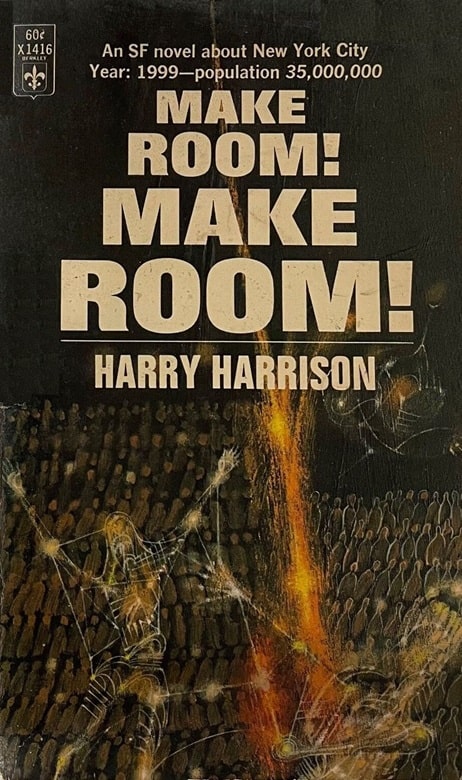 |
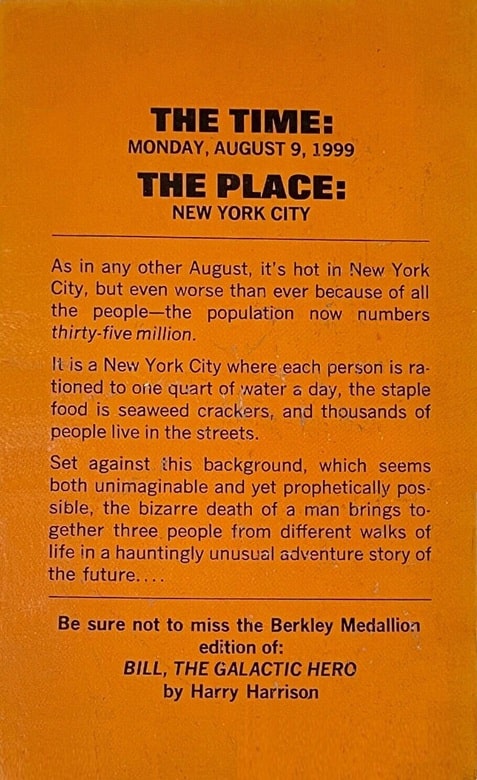 |
Make Room! Make Room! (Berkley Medallion, July 1967). Cover by Richard Powers
Harry Harrison was a true believer. Like Isaac Asimov, Terry Carr, Donald Wollheim, Gardner Dozois, Lin Carter, Damon Knight and a handful of others, he dedicated his life to science fiction, and in a multitude of roles, as writer, editor, critic, and scholar.
His fiction, however, has been largely — and unjustly — forgotten, and in the dozen years since his death in August 2012, all his books have gradually gone out of print, including once-popular novels like Make Room! Make Room! (filmed as Soylent Green in 1973) and The Stainless Steel Rat, one of the top-selling SF novels of the 60s, which spawned a hugely popular series that ran for twelve volumes.
So I was delighted to see Reactor (still known by fans under its secret identity, Tor.com) shine a long-overdue spotlight on our boy Harrison late last year. In “Make Room! Make Room! For Harry Harrison!” Anthony Aycock provides a brief overview of Harrison’s career, and introduces modern readers to his best work.
[Click the images to make room for bigger versions.]
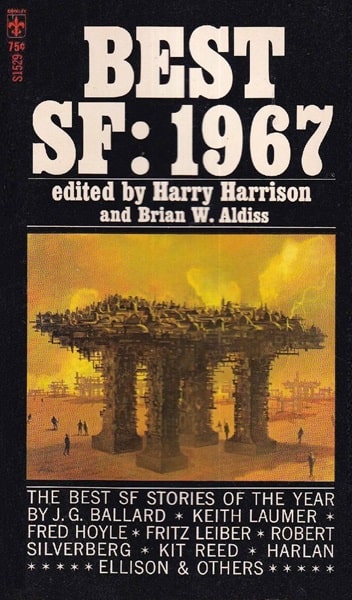 |
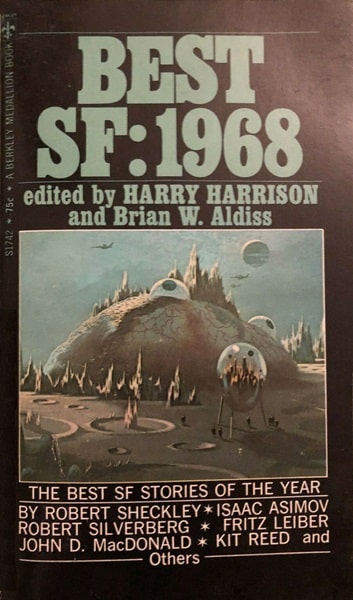 |
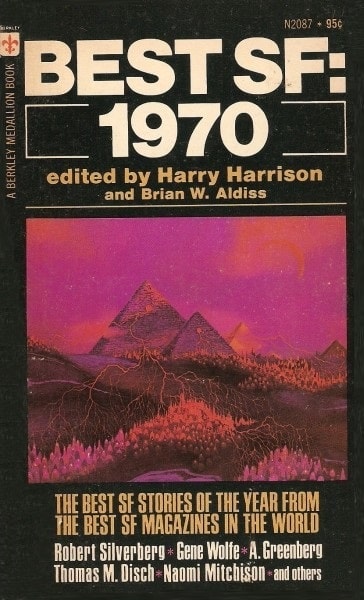 |
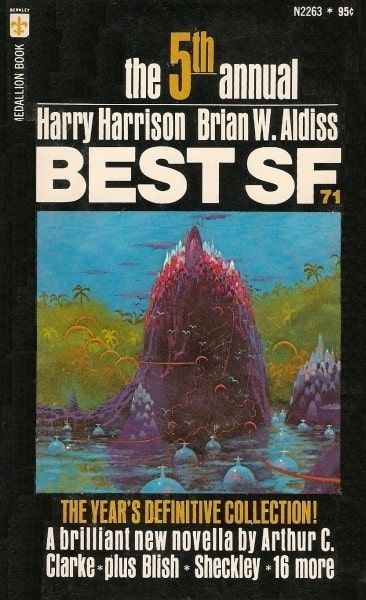 |
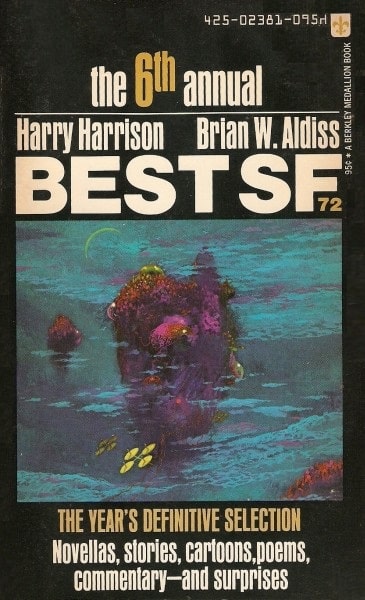 |
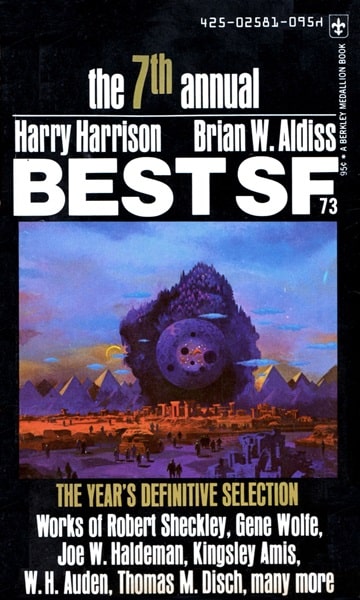 |
Volumes 2-7 in the Best SF series, edited by Harrison and
Brian Aldiss (Berkley Medallion, 1968-1974). Covers by Paul Lehr
Harrison’s career spanned nearly six decades. He was the main writer of the Flash Gordon newspaper strip in the 1950s and 1960s (you can read several of his collected story arcs in the splendid Comics Revue magazine, edited by Rick Norwood). With Brian Aldiss he edited nine volumes of Best SF, and the monumental collection 50 in 50 (Tor, 2002) gathers 50 of his own stories written over 50 years.
His last novel was The Stainless Steel Rat Returns, published by Tor in 2010. He was inducted into the Science Fiction Hall of Fame in 2004, and in 2009 received perhaps the highest honor our field has to offer, the Science Fiction & Fantasy Writers Association Grand Master Award.
But in the opening paragraphs of his Reactor piece Aycock fills in plenty of details I didn’t know about Harrison, including his work for EC Comics.
Harrison… was a dogged and versatile writer and artist. After serving in the U.S. Army Air Forces during World War II, Harrison worked as an illustrator for various science fiction magazines and comic books, most notably the EC Comics titles Weird Fantasy and Weird Science. Later, he was the main scribe of the Flash Gordon comic strip and the ghostwriter of several tales featuring Leslie Charteris’s character Simon Templar, a.k.a. The Saint. A member of New York’s so-called Hydra Club, he counted among his friends such luminaries as Alfred Bester, James Blish, Anthony Boucher, Avram Davidson, Lester del Rey (who would marry Harrison’s first wife, Evelyn, after the couple’s 1951 divorce), Judith Merril, Frederik Pohl, L. Sprague de Camp, Theodore Sturgeon, and Isaac Asimov. He edited magazines and anthologies, including, with the British writer Brian Aldiss, the first nine volumes of The Year’s Best Science Fiction anthology series.
And, of course, he wrote books. Sixty or so in all… [he] was a regular in sci-fi magazines for the next few years until the publication of his first novel, Deathworld, in 1960. You can see how it straddles the decades, creating what one reviewer calls “a Golden Age conceit imbued with New Age ideals.” Jason dinAlt is a gambler with psychic abilities who travels to a planet called Pyrras, or Deathworld. The sobriquet comes from the fact that everything on the planet — animals, plants, the atmosphere — is deadly to humans. The Pyrrans are divided and have no hope of survival unless Jason can unite them. It is a tale of ecological disaster that can only be ameliorated through the reconciliation of competing social views. (Sound familiar?)…
But Aycock focuses the bulk of his article on Harrison’s greatest literary success: The Stainless Steel Rat and its sequels.
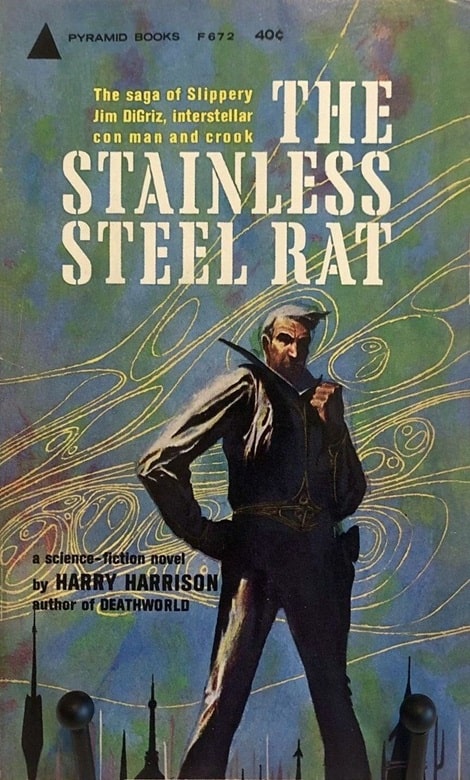 |
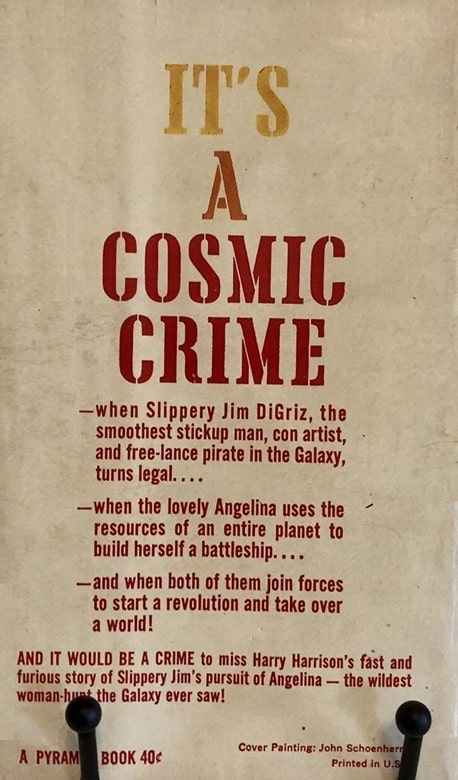 |
The Stainless Steel Rat (Pyramid Books, November 1961). Cover by John Schoenherr
Here’s Aycock again.
The Stainless Steel Rat (1961) is… an expansion of a story that appeared in the August 1957 issue of Astounding Science Fiction [and] was Harrison’s biggest success, inspiring eleven sequels, a gamebook, a board game, a Commodore 64 video game, and a comic book series. The story centers on James Bolivar diGriz, a.k.a. Slippery Jim or the Stainless Steel Rat, a thief and con man who (not unlike the star of Harrison’s old ghostwriting assignment, Simon Templar) steals only from those who can afford it — i.e., companies with excellent insurance policies. He runs afoul of Harold Inskipp, a crook-turned-cop who cajoles diGriz into joining his collective of crooks-turned-cops called the Special Corps. On his first mission, diGriz matches wits with the beautiful but murderous Angelina, who, like diGriz, ends up joining the Corps — and falling in love with him to boot.
Unlike the tortured environmentalism of Deathworld and the Malthusian crisis of Make Room! Make Room!, Harrison’s Rat series is an escapist delight: robots, warships, faster-than-light space travel, and a loosely-organized system of interstellar government. Basically, it’s Star Trek sans Gene Roddenberry. The books aren’t laugh-out-loud funny, yet they move with a briskness and buoyancy that will make you smile… Slippery Jim is an antihero in the vein of Captain Jack Sparrow — entertaining, droll, a cad with a moral compass (he steals everything, but abhors killing)…
And there were other triumphs, such as Bill, the Galactic Hero (1965), which filmmaker Alex Cox described as “the great, transgressive riposte to Starship Troopers” and Terry Pratchett, who knew a thing or two about comedy, called “the funniest science fiction novel ever written.” (The six sequels were less well-received.) His Eden trilogy (1984-1988), an alternate history in which dinosaurs survive extinction to become superintelligent enemies of mankind, has been called “by a considerable margin Harrison’s best work.”
Aycock’s entire article is worth reading. Check it out here.
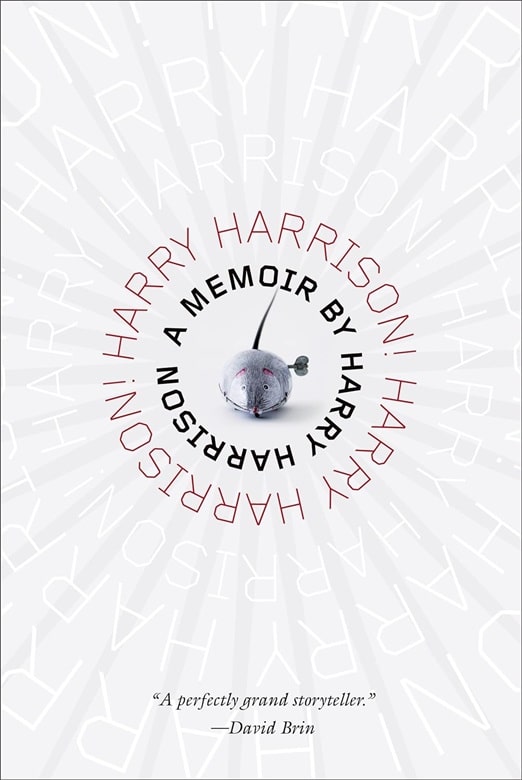 |
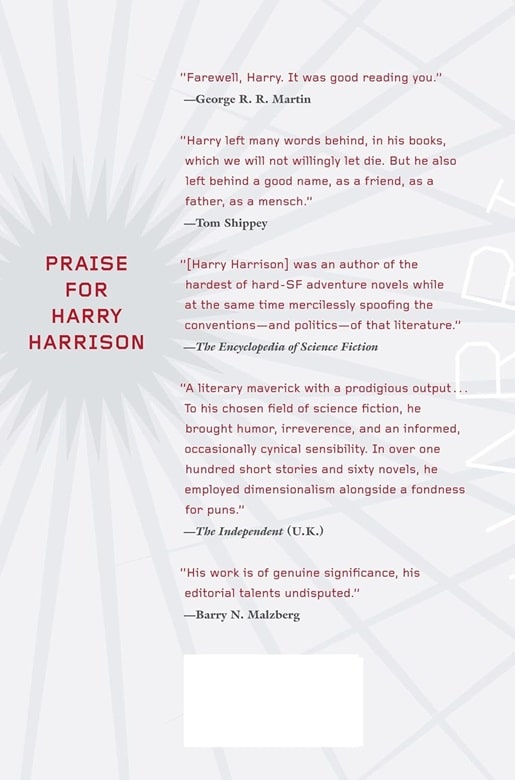 |
Harry Harrison! Harry Harrison! (Tor, November 2014)
My own favorite book by Harrison was also his last: Harry Harrison! Harry Harrison!, a memoir that appeared two years after his death. A delightful look back at his career, Harrison tells of the ups and down of a life as a full time writer, the making of Soylent Green, his friendships with other SF writers, and especially his relentless travels with his family in tow, which caused him no end of difficulties. In the process Harrison names names, tells a lot of great stories, and gives us a peek behind the scenes at the tight-knit community of late 20th Century science fiction. And yes, that’s a stainless steel wind-up rat on the cover.
Our recent coverage of Harrison includes:
Harry Harrison, March 12, 1925 – August 15, 2012 (2012)
Hell’s Cartographers, edited by Brian W. Aldiss and Harry Harrison (2013)
Farewell Fantastic Venus! edited by Brian W. Aldiss with Harry Harrison (2017)
Birthday Reviews: Harry Harrison’s “The Mothballed Spaceship” by Steven H Silver (2018)
The Year’s Best SF 9, edited by Brian Aldiss and Harry Harrison (2019)
The Case Against Environmental Exploitation: The Deathworld Trilogy, by James Enge (2019)
The Golden Age of Science Fiction: Make Room! Make Room!, by Steve H Silver (2019)
The Astounding-Analog Reader, edited by Harry Harrison and Brian W. Aldiss (2019)
Harry Harrison is unjustly forgotten today. I think Christopher Priest said it best in his obituary for The Guardian.
Harrison was an extremely popular figure in the SF world, renowned for being amiable, outspoken and endlessly amusing. His quickfire, machine-gun delivery of words was a delight to hear, and a reward to unravel: he was funny and self-aware, he enjoyed reporting the follies of others, he distrusted generals, prime ministers and tax officials with sardonic and cruel wit, and above all he made plain his acute intelligence and astonishing range of moral, ethical and literary sensibilities.
Do yourself a favor, and track down one of Harrison’s books today. I recommend one of his wonderful anthologies with Brian Aldiss, including Farewell Fantastic Venus and The Astounding-Analog Reader.
I must have read Bill the Galactic Hero a half a dozen times back in the day, and the Deathworld and Stainless Steel Rat books are also favorites. Harrison never let you down.
Thomas,
Never read Bill, the Galactic Hero — but several folks have come forward to recommend it in the last few days. Looks like another book I overlooked. At this rate, I’ll need to live to 110 just to rectify all the literary sins of my youth — let alone catch up on books published after 1990!
Bill, the Galactic Hero (Avon, November 1979). Cover by McMacken
My copy is the oversize 1975 Avon “Equinox SF Rediscovery” edition. I love those books – I have several of them.
Not entirely forgotten– his “Stainless Steel Rat” novels are some of the science fiction most constantly on waitlist at my local libraries, and that’s with duplicates of most in the catalogue.
He ghost-wrote some Charteris Templar novels?! [Expletive]! I never knew! Time to go sifting through my collection to see if I have them.
K,
I never knew Harrison ghost-wrote The Saint either! My Harrison collection keeps getting more and more incomplete every year….
Your Harrison collection, my Templar collection– it’s rather splendid and remarkable that this creator of excellent fiction can leave us and still somehow leave new things for us to discover. What a great sort of legacy!
Oh my god, I’d completely forgotten about his Eden work! I loved me some Harrison back in the day. Thanks for the trip down memory lane. Might have to see if I can get my hands on those Eden books again…
Pete,
The Eden trilogy has been out of print since the iBooks edition in 2001, but Tor does have digital editions available. Of course, the digital versions aren’t nearly as nice to hold in your hands, and they lack the cool cover art — like Keith Parkinson’s spectacular cover for the third volume, Return to Eden.
Return to Eden (Bantam Spectra, August 1988)
I think of him as a pro’s pro — for good and ill. As Thomas says, he never lets you down — well, not until the later Stainless Steel Rat books, which got tiresome. But he rarely truly thrilled me, either. He did contribute very widely — good editorial work, lots of promotion of international writers, lots of, so I understand, behind the scenes work.
I was reminded today of his 1971 Nebula nominee “By the Falls”, a very good story, but very uncharacteristic of him.
Rich,
I’ve never read “By the Falls” — but I happen to have a stack of Denny Lien’s If magazines in my garage. Including the January 1970 issue, with Harrison’s story. Just the thing for my day off this Friday!
Worlds of If, January 1970. Cover by Jack Gaughan
I remember Mr. Harrison starting from the movie tie-in edition of Make Room! Make Room! that Scholastic Book Services offered, back in 1973. And I agree that his Eden books are his best, straightforward sf stories.
Where I veer from Received Opinion is my preference for Star Smashers of the Galaxy Rangers as his comedy gold standard. But your Kessel Run parsecs may vary, and that is perfectly fine, since you are still reading Mr. H.
Oh, and he did also suffer one of the worst re-titling mistakes when the US edition of his mega-engineering opus came out as Tunnel Through the Deeps while its UK edition sang with the title A Transatlantic Tunnel, Hurrah!.
The Analog serial of Tunnel was also called A Transatlantic Tunnel, Hurrah!
And I quite enjoyed Star Smashers, too.
Eugene,
A Transatlantic Tunnel, Hurrah! is an infinitely superior title.
I think Jim Baen restored the UK title when he bought the paperback rights for Tor in 1981.
A Transatlantic Tunnel, Hurrah! (New English Library, October 1976). Cover by Gordon C. Davies
Thank you for shining a well-deserved light on Harry Harrison. I just ordered a copy of his memoir, something I somehow had missed. Looking forward to reading it. Harrison’s Stainless Steel Rat books are probably my favorites overall of his works. And while I somewhat agree with Rich’s comment that the later Rat books may become “tiresome”, they’re still fun reads.
Mark,
Let us know what you think of the memoir! Tor sent me a copy a decade ago and I sat down to flip through it, and before I knew what happened several hours had passed and my kids were clamoring for dinner. I never did finish the whole thing, but I was astonished at how readable — and fascinating — it was.
Harrison knew how to spin an anecdote, and the tales of his family travels were both inspiring and deeply anxiety-inducing. It was hard enough to raise a family on a writer’s salary in the 60s and 70s that Harrison felt driven to find a country with a lower cost of living, and that quest cost him (and his long-suffering family) no end of troubles.
I also still read the Deathworld and To the Stars trilogies on a regular basis. I love them, they seem to be a part of fantastical SF. I remember reading Into the Stars and dreaming about owning a holographic computer like Jan did.